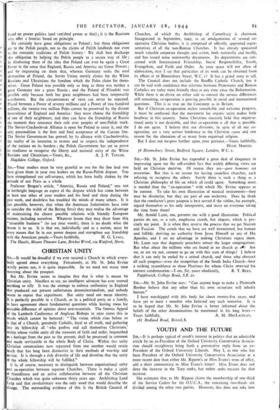Sts,—Mr. St. John Ervine has expended a great deal of
eloquence in impressing upon me the self-evident fact that widely differing views are held on Christian doctrine. Of course they are—quot homines tot sententiae. But that is no reason for having countless churches, each refusing to recognise the others. Surely there is such a thing as a Christian philosophy of life on which all could agree. Something more. is needed than the " co-operation" with which Mr. Ervine appears to be content. To take his own illustration of musical instruments—they may be dissimilar, but they are part of one orchestra. Does he think that the conductor's great purpose is best served if the violins, for example, regard themselves as his only interpreters, and insist on everyone taking the time from them?
Mr. Arnold Lunn, too, presents me with a. good illustration. Political parties do .not, as a rule, emphasise creeds, but slogans, which is pre- cisely my point. It is when they reverse the process that we get Nazism and Fascism. The creeds that we have are well intentioned, but human and fallible, deriving no authority from Jesus Himself or any of His Apostles, and I see no advantage in making Christians repeat them. Mr.-Lunn says that dogmatic preachers attract the larger congregations. But what about the millions who are found in no church at OP Are we, or are we. not, content to go on with this state of things? I believe that it can only be ended by a united church, and those who obstruct all such progress—even the recognition of the South India Church—bear a striking resemblance to those Pharisees for whom Christ reserved his
sternest condemnation.—I am, Sir, yours obediently, R. T. REES. Pappletvick, College Road, S.E. 21.
Sts,—Mr. St. John Ervine says: "Can anyone hope to make a Plymouth Brother believe that any other than his own sectarians will inhabit heaven."
I have worshipped with this body for about twenty-five years, and have yet to meet a member who believed any such nonsense. It is to be hoped that Mr. St, John Ervine is better informed about the beliefs of the other denominations he mentioned in his long letter.—


























 Previous page
Previous page